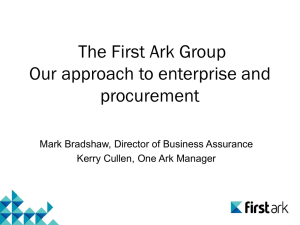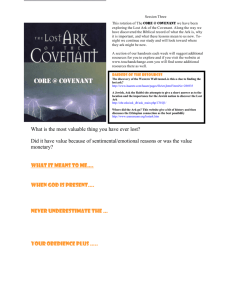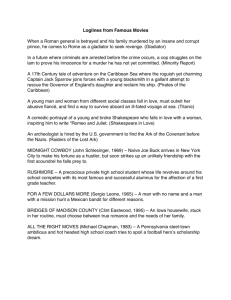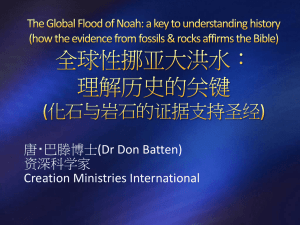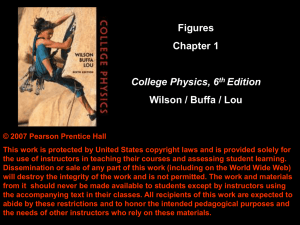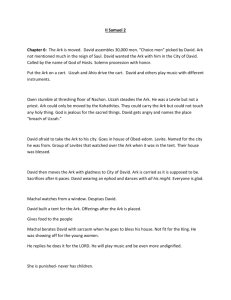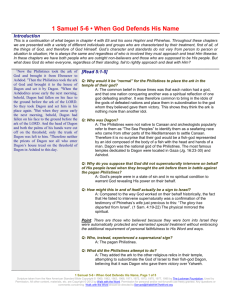71-The Organization and Worship of Krisztus Egyhaza. rev. 1
advertisement
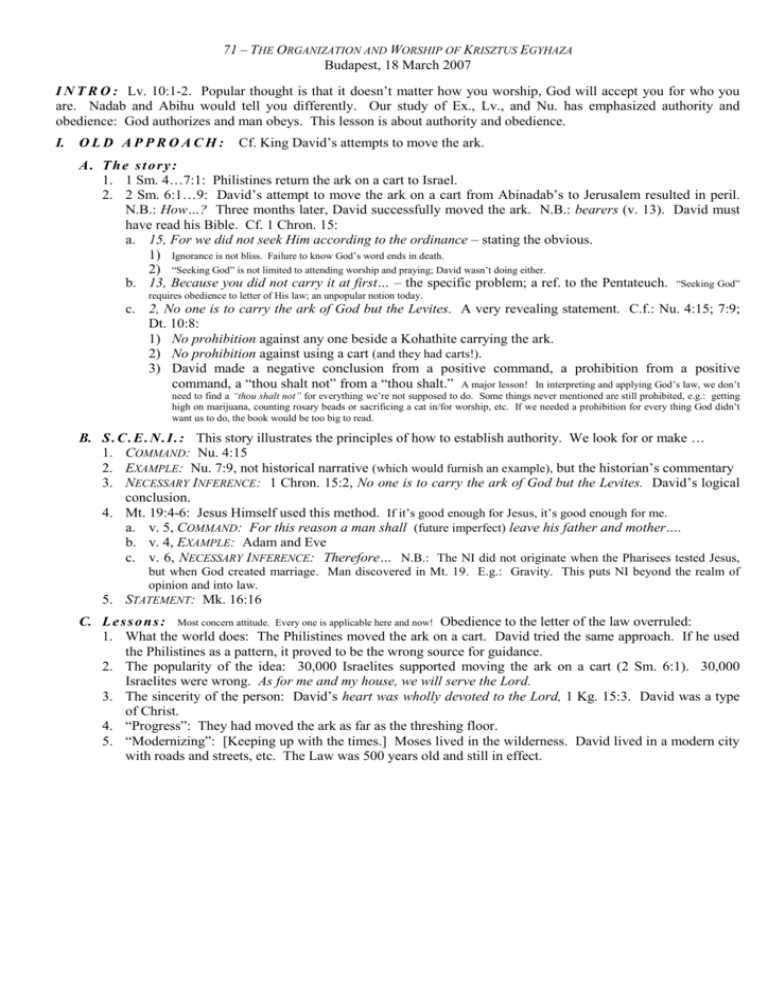
71 – THE ORGANIZATION AND WORSHIP OF KRISZTUS EGYHAZA Budapest, 18 March 2007 I N T R O : Lv. 10:1-2. Popular thought is that it doesn’t matter how you worship, God will accept you for who you are. Nadab and Abihu would tell you differently. Our study of Ex., Lv., and Nu. has emphasized authority and obedience: God authorizes and man obeys. This lesson is about authority and obedience. I. O L D A P P R O A C H : Cf. King David’s attempts to move the ark. A. The story: 1. 1 Sm. 4…7:1: Philistines return the ark on a cart to Israel. 2. 2 Sm. 6:1…9: David’s attempt to move the ark on a cart from Abinadab’s to Jerusalem resulted in peril. N.B.: How…? Three months later, David successfully moved the ark. N.B.: bearers (v. 13). David must have read his Bible. Cf. 1 Chron. 15: a. 15, For we did not seek Him according to the ordinance – stating the obvious. 1) Ignorance is not bliss. Failure to know God’s word ends in death. 2) “Seeking God” is not limited to attending worship and praying; David wasn’t doing either. b. 13, Because you did not carry it at first… – the specific problem; a ref. to the Pentateuch. “Seeking God” requires obedience to letter of His law; an unpopular notion today. c. 2, No one is to carry the ark of God but the Levites. A very revealing statement. C.f.: Nu. 4:15; 7:9; Dt. 10:8: 1) No prohibition against any one beside a Kohathite carrying the ark. 2) No prohibition against using a cart (and they had carts!). 3) David made a negative conclusion from a positive command, a prohibition from a positive command, a “thou shalt not” from a “thou shalt.” A major lesson! In interpreting and applying God’s law, we don’t need to find a “thou shalt not” for everything we’re not supposed to do. Some things never mentioned are still prohibited, e.g.: getting high on marijuana, counting rosary beads or sacrificing a cat in/for worship, etc. If we needed a prohibition for every thing God didn’t want us to do, the book would be too big to read. B. S . C . E . N . I . : This story illustrates the principles of how to establish authority. We look for or make … 1. COMMAND: Nu. 4:15 2. EXAMPLE: Nu. 7:9, not historical narrative (which would furnish an example), but the historian’s commentary 3. NECESSARY INFERENCE: 1 Chron. 15:2, No one is to carry the ark of God but the Levites. David’s logical conclusion. 4. Mt. 19:4-6: Jesus Himself used this method. If it’s good enough for Jesus, it’s good enough for me. a. v. 5, COMMAND: For this reason a man shall (future imperfect) leave his father and mother…. b. v. 4, EXAMPLE: Adam and Eve c. v. 6, NECESSARY INFERENCE: Therefore… N.B.: The NI did not originate when the Pharisees tested Jesus, but when God created marriage. Man discovered in Mt. 19. E.g.: Gravity. This puts NI beyond the realm of opinion and into law. 5. STATEMENT: Mk. 16:16 C. L e s s o n s : Most concern attitude. Every one is applicable here and now! Obedience to the letter of the law overruled: 1. What the world does: The Philistines moved the ark on a cart. David tried the same approach. If he used the Philistines as a pattern, it proved to be the wrong source for guidance. 2. The popularity of the idea: 30,000 Israelites supported moving the ark on a cart (2 Sm. 6:1). 30,000 Israelites were wrong. As for me and my house, we will serve the Lord. 3. The sincerity of the person: David’s heart was wholly devoted to the Lord, 1 Kg. 15:3. David was a type of Christ. 4. “Progress”: They had moved the ark as far as the threshing floor. 5. “Modernizing”: [Keeping up with the times.] Moses lived in the wilderness. David lived in a modern city with roads and streets, etc. The Law was 500 years old and still in effect. II. N E W A P P L I C A T I O N S : Col. 3:17, in the name of is a reference to authority. E.g., “I come in the name of the King.” Krisztus Egyhaza looks different than many other churches. The reason is, we take authority seriously. A. O u r o r g a n i z a t i o n : When the apostles died, they left local churches. That’s all we read about. We need to approach this like David approached the law for moving the ark: we draw a negative conclusion from postive examples. The Bible is “silent” about any other earthly organization than the church: Diocese; Missionary Societies, etc. are innovations. We cannot introduce them. Furthermore, local churches are… 1. SELF-GOVERNING: Ac. 20:7, 28; 1 Pe. 5:1f. Paul and Peter referred to local churches, where the elders were members. Dioceses are innovations. 2. SUFFICIENT: The apostles left local churches to fulfill the work. Missionary societies are innovations. B. O u r w o r s h i p : 1 Co. 14, when you assemble… (v. 26) – a worship environment. The cessation of miracles changed worship; we don’t do everything the first century Christians did. Some things we cannot do at all. Some things we can do, but differently. We… 1. SING: 1 Co. 14:26, ψαλμός n. – a song of praise (BDAG). This doesn’t tell us what to do. Cf. Col. 3:16; Eph. 5:19, ψάλλω v. – to sing with or without musical instrument, sing, sing praise (BDAG). Alone, this doesn’t support singing accompanied by musical instruments. All that is necessary to fulfill this command is people and a song. Analogy: “Play” sports. All that is necessary to fulfill this is people and a game. Spectators aren’t necessary. People can sing without musical instruments. The NT never mentions them. Respect silence. And etymology seems to favor this: “The original meaning of the word was ‘pluck.’” (BDAG). The instrument, the heart strings. Cf. singing and making melody with your heart to the Lord. N.B.: Sound quality isn’t the issue. Hearts are. 2. TEACH: 1 Co. 14:26, διδαχή n. – the content of teaching (BDAG). For edification, this limits the content. E.g.: The math classes teach math. Math graduates know math. Cf. English. Some churches hold classes to teach people how to use the internet or sew. Some show movies and host rock bands, etc. Ct. 1 Tm. 4:16. 3. PRAY: 1 Co. 14:13-14, προσεύχομαι dep. – to petition, pray (BDAG). Cf. Poll: Do You Believe In A ‘Private Prayer Language’? 57% - yes. 43% - no. (One News Now, March 14, 2007) I’m in the 57%. But I know they’ve ceased, 1 Co. 13:8. 4. LORD’S SUPPER: 1 Co. 11:1-2, traditions aren’t inherently bad, it depends on the source. 23-26. Cf. Ac. 20:7; a. The first day of the week – the day that follows the last day of the previous week – the Sabbath. 1) “Different countries use different calendars.” The Bible is the standard. All modern calendars are reconcilable to the Bible. The Jewish Sabbath corresponds to Saturday. 2) Partaking of the Lord’s Supper on a day other than Sunday (Catholic, etc.) is an innovation. b. Phraseology and example imply that they met every Sunday, cf. Jn. 20:19, 26. We know we’re authorized to do this. When we observe it only once a month/quarter/year, we “go beyond” or maybe not far enough. 5 . CONTRIBUTION: 1 Co. 16:2 6. LED BY MEN ONLY: [I’d be remiss if I did not mention this; the threat is too real.] 1 Co. 14 pronouns, “He” (statement). Confused by “gender corrected” versions? Cf. 1 Co. 14:34; 1 Tm. 2:1. The reason we don’t allow women to lead in worship is not because we dislike women or think they are lesser beings. The reason is, God commands that we worship this way. III. C O N C L U S I O N : The world praises innovation. If we’re not careful, innovations will invade this church. Remember the lessons of Nadab and Abihu, and Uzzah!


